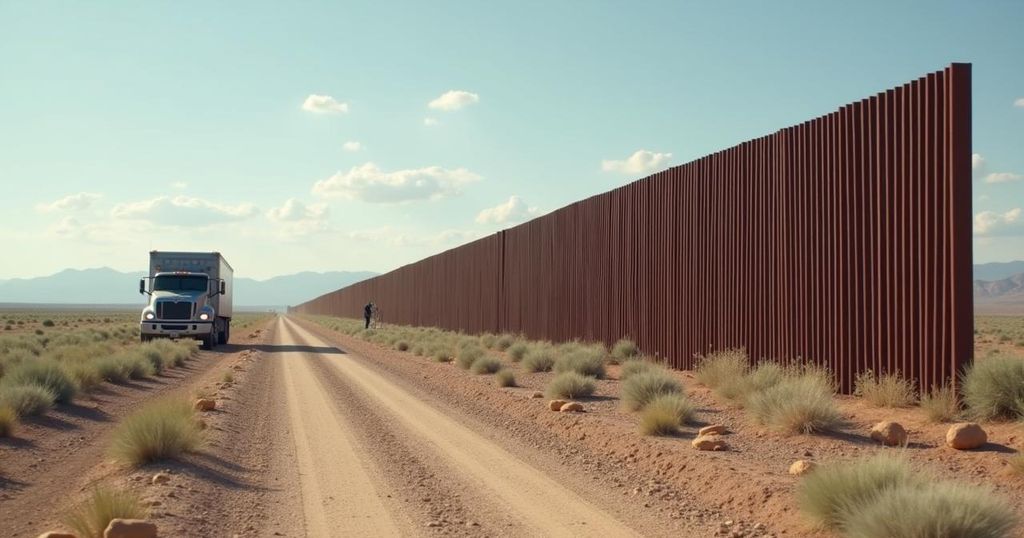As U.S. Election Approaches, Mexico Increases Border Enforcement and Blocks Migrants
As the U.S. election approaches, Mexico intensifies border enforcement, minimizing migrant crossings due to an informal agreement with the Biden administration. Mexican policies are aimed at stabilizing the border to protect trade interests while navigating political ramifications tied to U.S. immigration policy debates.
As the United States election approaches, Mexico is intensifying its border enforcement measures, significantly reducing the influx of migrants toward the U.S. border. This reduction in illegal crossings has been attributed to a largely unwritten agreement between the Biden-Harris administration and the Mexican government, aimed at maintaining order at the border and facilitating the uninterrupted flow of trade, which is crucial for Mexico’s economy. The strategic importance of this agreement is underscored by the upcoming U.S. presidential election, wherein immigration policy has emerged as a top issue. With the Migrant encounters at the U.S. border having dropped dramatically—from almost 250,000 in December 2023 to under 60,000 the following months—the Mexican government under President Claudia Sheinbaum appears keenly aware of its potential impact on U.S. political dynamics. Reports reveal that families such as the Sarmiento family from Venezuela, who aspire to migrate to the U.S., face substantial barriers and heightened risks during their journey through Mexico. Previously, individuals could obtain travel visas, enabling smoother transit. However, the current climate has forced many into precarious situations, seeking refuge in temporary encampments in urban centers like Mexico City. The enforcement of migrant control policies is manifest in the operational tactics employed by Mexican agents, which include tightening asylum processes and initiating deportations. In December 2023, the Biden administration proactively engaged with Mexico to address a significant spike in migrant crossings, which had overwhelmed U.S. cities. Measures included the imposition of stricter migration duties along key transportation lines and a notable suspension of traffic at select ports—a move that directly hurt Mexico’s commercial interests and prompted immediate compliance from Mexican authorities. Following this collaboration, Mexico has escalated enforcement measures, including increased visa requirements and more aggressive deportation of migrants, signaling a paradigm shift in its immigration policy. Critics argue that such actions put vulnerable populations at risk amid a broader international context of humanitarian responsibility. As Mexico under President Sheinbaum navigates its role in U.S.-Mexico relations, the implications of these tactics will be closely monitored as the November elections approach, highlighting a dynamic interplay between domestic politics and international cooperation in migration-related matters.
The article addresses the growing enforcement actions taken by Mexico in response to increasing migration towards the U.S., particularly as the 2024 U.S. presidential election nears. The context involves a largely informal agreement between the U.S. and Mexico, formulated under the Biden administration, which prioritizes the stabilization of migration flows. This strategic shift aligns with political considerations within Mexico, where the impact of migration on the U.S. electoral climate is significant. By effectively controlling migrant traffic, Mexico aims to bolster its economic interests while simultaneously managing its international reputation regarding migrant treatment.
In conclusion, Mexico’s enhanced border enforcement is largely motivated by economic considerations and the political ramifications of its actions on the U.S. electoral process. As demonstrated by the reduction in migrant encounters and the implementation of stringent immigration measures, the bilateral relationship between the U.S. and Mexico is increasingly characterized by a shared focus on limiting illegal crossings in exchange for perceived economic growth. However, this approach also raises pressing ethical questions regarding the treatment of migrants and the responsibilities of both nations under international humanitarian laws.
Original Source: www.usatoday.com




Post Comment